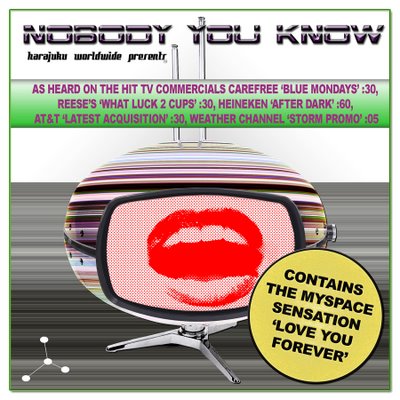 While browsing forums for music or production professionals, I often come across queries from young people asking how they might get their music licensed in commercials. Should they send their demo tapes to music supervisors? Should they create a MySpace page? Would it be a good idea to make electronic press kits? All of the above, of course, but what people really want to know is if there's a way to beat the system? With tongue only partly in cheek (because so much of this is real advice), I submit the following plan of action:
While browsing forums for music or production professionals, I often come across queries from young people asking how they might get their music licensed in commercials. Should they send their demo tapes to music supervisors? Should they create a MySpace page? Would it be a good idea to make electronic press kits? All of the above, of course, but what people really want to know is if there's a way to beat the system? With tongue only partly in cheek (because so much of this is real advice), I submit the following plan of action:1. Make 10-20 CD demos with cool kitschy artwork. No band/mug shots unless you re a female. If that is the case, slather your nude and deftly Photoshop-ed body across the cover. Apply sticker that reads:
Includes the Number One Hit Single As Heard On Myspace.com!
Or Facebook, or whatever the hot web site is at the moment, okay? Remember Six Degrees? We all know Myspace is so over, anyway.
2. Create mock letterhead with a trendy sounding name for your non-existent management company. You know, something that sounds completely plugged into pop culture. Feel free to use HARAJUKU WORLDWIDE. I made it up and it can be our little inside secret. 'Dude you have a Japanese management company? That's so cool!' Blah blah blah.
Now, writing from the perspective of a manager, write a cover letter, which gives the misleading impression that you are actually who you say you are –a manager, possibly Japanese–, and that among your roster of fabuloso acts, one of your artists has a knack for writing such ‘cinematic’ sounding tracks, that when Clive Davis heard them, even he said:
"Wow".
3. Messenger or Fed Ex your CDs to local editors of film/TV editorial companies. You could in fact email MP3s, but in my experience real managers send out real press kits, and often with swag, like a T-shirt maybe or a signed autographed picture of the artist. Who would want an autographed picture of you? You'd be surprised. Any number of New York diners and pizza parlors, for instance. You might also mention that you read about the company on "some European branding blog”. Whatever you do, don’t forget to scrawl –Requested Material– on cover of package. That said, if you really want someone to give your music serious consideration and if you're ready to be treated like a professional: Then forget express shipping, and messenger the CD over in a Gift Basket – I’m talking gourmet cheese and chocolate truffles.
You are going to be a star, my friend.
4. Please tell me that you were smart enough to send the CDs to specific people whose names you found by scouring the Internet (Google: Association of Independent Commercial Producers, Award Winning Commercials, Commercial Editorial Houses or Commercial Post Production –and go directly to the CLIO and AICP sites and find out who the past award honorees were). You will be particularly interested in collecting the names of –and finding the contact info for: Producers, Art Directors and Copywriters who work at advertising agencies; Commercial editors and Broadcast Designers who work at editorial firms and Post Production houses respectively.
If you also want to get hired as a freelance composer you can also gather the information for music and sound design houses and send your demos to them, as well. You can actually initiate a career as a freelance composer following this same outline and pitching yourself as a writer to music and sound design firms, or simply as a sound designer to film/video editorial companies who frequently keep such a person on staff, stuffed in a closet next to the machine room but nevertheless nicely furnished with ProTools and a bowl of candy. However, for now, let's focus our limited resources on you the songwriter getting a commercial editor interested in a song or track that you've already written and recorded.
Once you know your demo package has been delivered, call these people every two or three weeks and pester them, but in a pleasant way. The first time you call them, be truthful about who you are, and why you want them to listen to your music. But when they ask you how you heard about them, lie and tell them that 'the cool folks at HARAJUKU WORLDWIDE' suggested you call and oh yeah, “they said great things about your work.”
Not your work of course, but the work of the person to whom you're speaking, okay?
Eventually, a film editor will listen to your music, dig it, and cut a TV commercial using one of your precious songs. Their client –the ad guys– will love your indie vibe, and after it goes live you can feel a smug satisfaction in having known all along that you're a genius, babe. More importantly, and more likely, you've come a lot cheaper than the agency paying a local Jingle Haven to rip you off. But don't actually impress upon them how cheap you are, because later you'll be increasing your rate –like in no time.
5. Therefore, when asked how much it will cost to license the track, you just say that:
“I have to check with my management, but I’m sure whatever you have budgeted is fine.”
Since you don’t have a track record, you might even let them use your Magnus Opus for free. Of course, you can still register the track with ASCAP or BMI and collect publishing.
6. So, now your romantic ballad, 'Love You Forever' has been used in a feminine hygiene spot. Great, so do yourself a favor and make a fresh batch of CDs and press kits, only this time, attach a sticker on cover of the jewel box that heralds your budding genius. It might read something like:
'Love You Forever' – As Heard on the Hit Carefree TV Commercial
7. Repeat this process ad infinitum in new markets – that means send your material out to other people/companies that you couldn’t afford to contact the first time around. But now you can because, of course, you're collecting publishing. That should at least cover stamps.
If you didn't send your CD to established music production companies the first time around, now would be a good time to do so. Nothing gets people interested in working with you like already being successful. Also, if you want to write original music for commercials and not just license songs, you'll either need to start your own production company or work through another party.
The reason for this is that major advertising companies want to work with vendors that carry an insurance policy called ERRORS & OMMISSIONS. This protects them in case YOU sold them music that turns out to infringe on someone else's copyright, whether by accident or as a result of conscious plagerization. And since people will sometimes ask you to write a track that is modeled on another track, you'll need to insure yourself against your own stupid mistakes.
However, if you choose to freelance or go on staff with a music house, you won't have to carry this insurance policy yourself.
So, who should you freelance for? Where should you start looking for a job? Well, you can start by knocking on the doors of people who belong to this organization:
Association of Music Producers
In a year or two the cover on your CD should look something like this:

8. Get ready cause your career is about to take off: Eventually the newbie director of the very first commercial that used your music is going to get his or her big Hollywood break and be given the opportunity to make a feature film. No doubt, you've got so much buzz happening yourself, that Hollywood will definitely want you to contribute your breakthrough unreleased single to the soundtrack. Upon the picture’s international smash release you’ll finally get signed to a major label –and on your terms, assuming of course you read every item in the 500 page contract they give you. Oh, who cares about creative control or money anyway, when you're going to be FAMOUS!
9. You've been signed! Your album is slated for immediate release two years from now. Finally, the big moment you've been waiting for: Go ahead and Login to one of the Music Industry message boards, like the Velvet Rope for instance, and tell the world how you're so like the next big thing. It feels good, doesn't it? Of course it does. But, like, leave after you post that and never go back because they'll shred you into little bitty pieces –entertainment forums are notorious for giving a platform to blood thirsty sharks– and it's no fun reading that bitter dreck. And your album will probably get shelved, anyway.
10. Regardless, from here on out, absolutely no mention of your past work in advertising. Sure, it was cool when it happened, but now you're an artist. Of course, you can keep the cover art from your original demo –if you still think it's any good– but why not at least change the sticker to something that promotes the fact that you've arrived, something awesome like:
As Heard On The Hit Movie 'Las Mamas Mas Sexy de Nueva York'
10. One last piece of advice: If you do write a hit song and if the track actually does chart –congratulations darling, here's an invoice for my consultation fee– ditch the sticker all together: we all know that movie rode to box office history on your coat tails, not the other way around. And while you're at it, tell the director to get lost because, really, these days there’s only enough time to thank God and your mom at the Grammies.
DIY, licensing